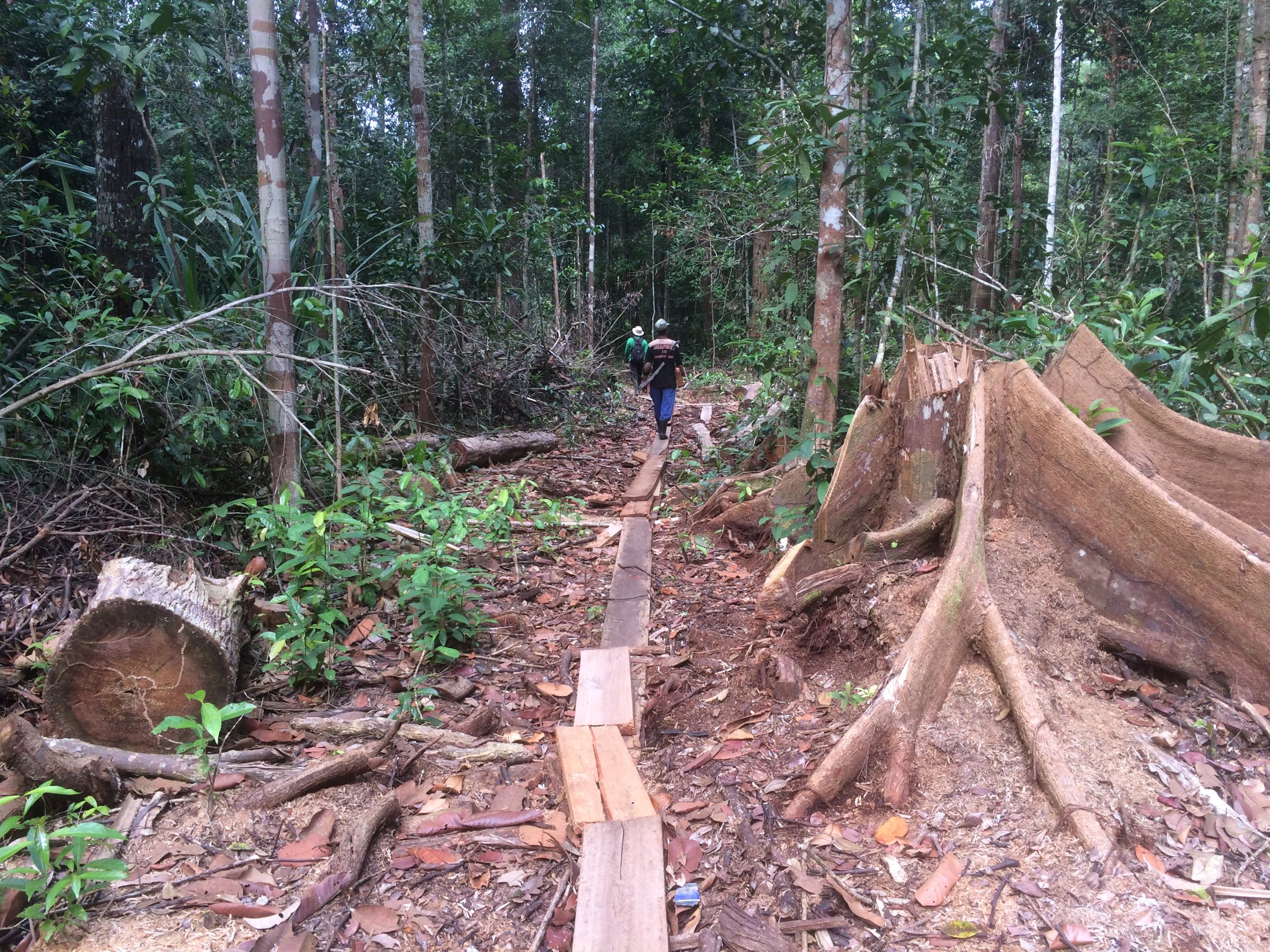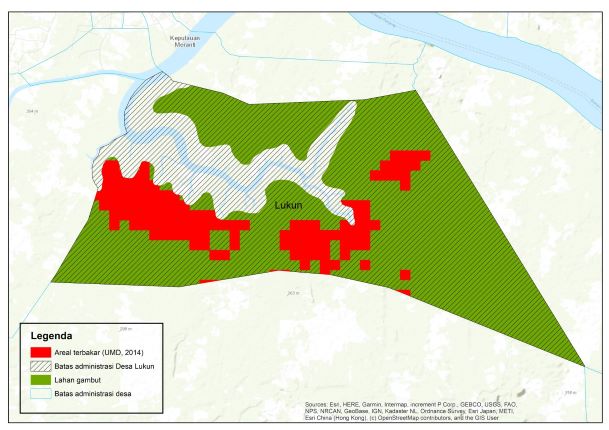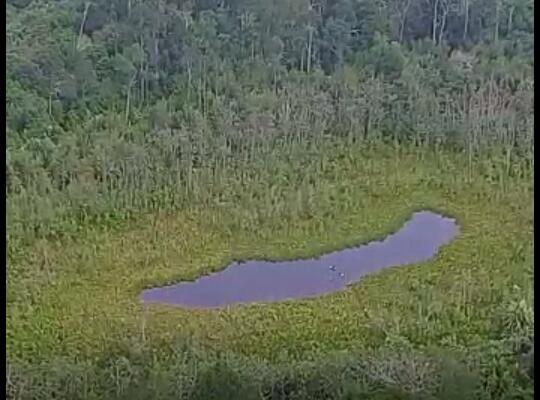Woman Fighting Oppression: Sumarni Laman
By Pantau Gambut
Ulu Mahmud Lake, the Last Defense of Lukun Village's Peat Ecosystem
Piles of logs from illegal logging can be seen at several points along the main road that connects three villages, i.e. Sungai Tohor, Sungai Tohor Barat, and Lukun. The peatlands beside the road appear to have been plotted.
In the past, the peat forest was a pulp company's concession area. When it was still being managed by the company, the residents of Sungai Tohor Village once protested to the government because there was no notification or dissemination about the concession permit, even when the company started cultivating the land.
The existence of concessions that threaten forest sustainability has made the local people continue to increase their protests on social media. On 14 June 2016, the Ministry of Environment and Forestry revoked the Business License for the Utilization of Timber Forest Products in Industrial Plantation Forest (IUPHHK-HTI) of the pulp company, covering an area of 10,390 hectares. After that, the community chose a Social Forestry scheme and submitted a Village Forest application to the Ministry of Environment and Forestry. On 17 March 2017, the Ministry issued a Village Forest Decree.
There are seven villages that have received the Social Forestry program, all of them are located around concession areas. Lukun Village gets the largest part, which is 2,400 hectares, based on the Social Forestry Decree.
On 10 February 2019, a fire occurred near the Village Forest area in Lukun. At that time, the fire lasted for almost two months and burned 1,450.73 hectares of peatlands. At the same time, illegal logging is also taking place in the Village Forest. There are many trails used by the loggers to enter and exit the forest. They cut down hardwood trees, such as kempas and meranti.

The ongoing illegal logging, as well as the threat of fire during the dry season, make the residents worried about the sustainability of Ulu Mahmud Lake ecosystem, which is not far from the burned area adjacent to the Lukun Village Forest.
The local name for the lake is Tasik Ulu Mahmud. Tasik means lake in Malay. When a fire occurs, the National Disaster Management Agency (BNPB) helicopters take water from this lake to extinguish the fire (water bombing). Ulu Mahmud Lake is important because it is the main water source during forest and land fires in Lukun Village. During the dry season, it is not easy to take large volumes of water to extinguish forest fires.
"If there is no water in the lake, we can’t extinguish the fire," said the Head of Lukun Village Forest Management Agency (LPHD), Amran.
Pantau Gambut also found a record of burned forest area near Lukun Village in 2014. According to the University of Maryland's Moderate Resolution Imaging Spectroradiometer (MODIS) Burned Area Product satellite sensor, the burned forest area was 3,038.97 hectares, including 2926.26 hectares of peatlands.

Amran and members of the Lukun LPHD continue to work to protect the village forest from deforestation and fires, so that Ulu Mahmud Lake remains sustainable. He hopes that the forest around Ulu Mahmud Lake will soon be designated as a protected area in a government regulation. "Our ancestors had forbidden us to cut trees around Ulu Mahmud Lake," said Amran. This advice shows how important the value of local wisdom is to protect Ulu Mahmud Lake.
Amran has been trying to find out about the illegal loggers. Unfortunately, he still doesn’t have the details of the culprits. Illegal logging is carried out in an organized manner. These loggers are good at doing their activities, including in choosing the time to cut trees. There are no logging activities every time the officers patrol the forest. Piles of wood can’t be found in the forest at that time. Or if they can find those piles of wood, they can’t find the owner. Amran hopes that the Ministry of Environment and Forestry can directly order their agencies to deal with the illegal logging problem.
"If there is an instruction from the central, the implementing agencies in the provinces and districts will be more serious in doing their job," said Amran
The Peat Restoration Agency report in 2017 explained that the forest area in Lukun Village was overgrown with various types of flora typical of peatlands. Of all the types of trees in the forest, punak and kempas are relatively few in number, making them difficult to find. These two types of trees have always been targeted by illegal loggers because they have high economic value.
Prayoto, Head of Section for the Protection and Conservation of Natural Resources and Ecosystems (KSDAE) and Community Empowerment in the Tebing Tinggi Timur Forest Management Unit (KPH), said that patrols are done quite frequently. However, every time the officers inspected the location, they only found piles of wood. "We didn't find the owner," said Prayoto.
Prayoto explained that to eradicate illegal logging, they need the support of other apparatus, i.e. the police, law enforcement division of the Ministry of Environment and Forestry, as well as the military at the village level. He said that this method will be effective in eradicating illegal logging. "I believe that illegal logging can be eradicated quickly and village forests managed by the residents can be protected," he said.
The cultural value of Lake Ulu Mahmud
Lake Ulu Mahmud is part of the Lukun Village residents’ culture. Since a long time ago, the communities around Tebing Tinggi District have used Ulu Mahmud Lake to carry out the bele kampung tradition, a ritual to ward off misfortune. "Just like a doctor in a hospital. Ulu Mahmud Lake is like a medicine, syrup, tablet," said Amran, who is also a community leader in Lukun Village.

During the bele kampung ritual, residents make miniature boats and houses from sago palm fronds and put them around the lake. Besides the miniatures, residents also serve eggs and ketupat rice cake. They believe the myth that three crocodiles in yellow, black, and white, will appear. This tradition used to be carried out every year. However, for the past seven years, people don’t hold the ritual anymore because it is considered contrary to the religious teachings of the majority of the residents.
The communities around Tebing Tinggi Timur Subdistrict also hold an annual ritual called Safar bath to ward off misfortune. Before the ritual, people will begin to clean the access to Ulu Mahmud Lake. Then they will build a container and fill it with water taken from the stream that flows to Ulu Mahmud Lake and the surrounding rivers.
The cultural and social values in the relationship between the people of Lukun Village and the peat forest around Ulu Mahmud Lake are proof of local wisdom that has long protected the people and the environment. "Similar local wisdom is often found in the Malay community in Riau," said Risdayanti, a researcher from the Faculty of Social and Political Sciences, Riau University.
Risdayanti explained that many cultural values are rooted in the natural environment around them. The Malay community sees the forest as a living entity that must be respected. "They highly value the plants, apart from the economic value," she said.
She mentioned the Pelalawan community as an example. The local people there are not allowed to cut trees without permission and there are penalties based on the customary rules. They can only cut trees that are no longer productive. "They can take them for firewood," said Risdayanti.
She said that illegal logging is influenced by the shift in cultural values that have been eroded due to economic pressures. The COVID-19 pandemic has also weakened the community's economy and jobs in urban areas have decreased. "Then people see the forest as an economic resource that can provide quick money," she said.
Risdayanti said that local governments need to strengthen positive laws and regulations that accommodate the value of local wisdom, so that people won’t look down on customary law. Protection of customary values will have a good impact on protecting the forests around the village. "Local governments must strengthen the local wisdom and its legal sanctions," said Risda.
Ulu Mahmud Lake attracts researchers
Ulu Mahmud Lake attracts researchers from the Faculty of Biology of Gadjah Mada University, the Faculty of Biology of Jenderal Sudirman University, and the Riau University Disaster Study Center. Their research was published in December 2019.
The study describes that Lake Ulu Mahmud is 140 meters long and 60 meters wide. The water depth is 5 to 7 meters. The total surface area of the water is 8,400 square meters. During the rainy season, the water level rises up to 50 centimeters. There is an additional 150 square meters of water that is inundated around the edge of Ulu Mahmud Lake.
Ahmad Muhammad, one of the researchers from the University of Riau, said that Ulu Mahmud Lake is a small peat ecosystem in Tebing Tinggi Timur. After studying more than 37 lakes in Riau's peatlands, he explained that Ulu Mahmud Lake is unique because it is small and hidden. "It is landlocked, not connected to the river body, a standalone water source," he said.
Ulu Mahmud Lake is more attractive to researchers during the peak of the rainy season, when the water will overflow in November, December, January. “It is a seasonal shallow swampy water, a true peat swamp forest, which is rarely found. And it still has a good vegetation formation,” said Ahmad.
The researchers also noted the presence of 22 bird species that are only found in Ulu Mahmud Lake. Five of them are endangered species protected by law, i.e. black eagle (Ictinaetus malayensis), white-bellied hornbill (Anthracoceros albirostris), rhinoceros hornbill (Buceros rhinoceros), greater green leafbird (Chloropsis sonnerati), and emerald dove (Chalcophaps indica).
A total of 39 bird species can also be found in other environments within the Lukun Village area. The researchers also explained that the threats and degradation that occurred in the Ulu Mahmud Lake area will reduce the number of microalgae and zooplankton that affect the food chain in the waters of Ulu Mahmud Lake. "In 2020, we found new illegal logging in the area. It's really too bad," he said.
Author : Zamzami
Editor : Bram Setiawan



